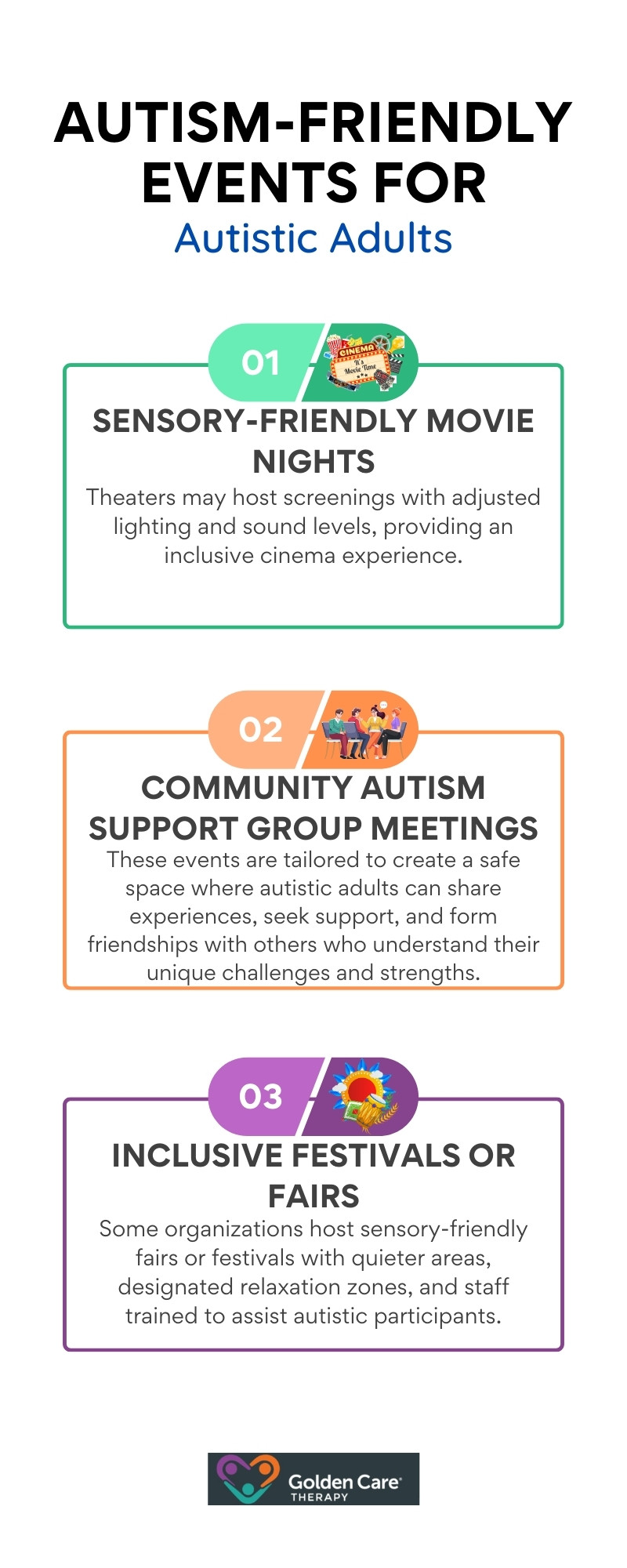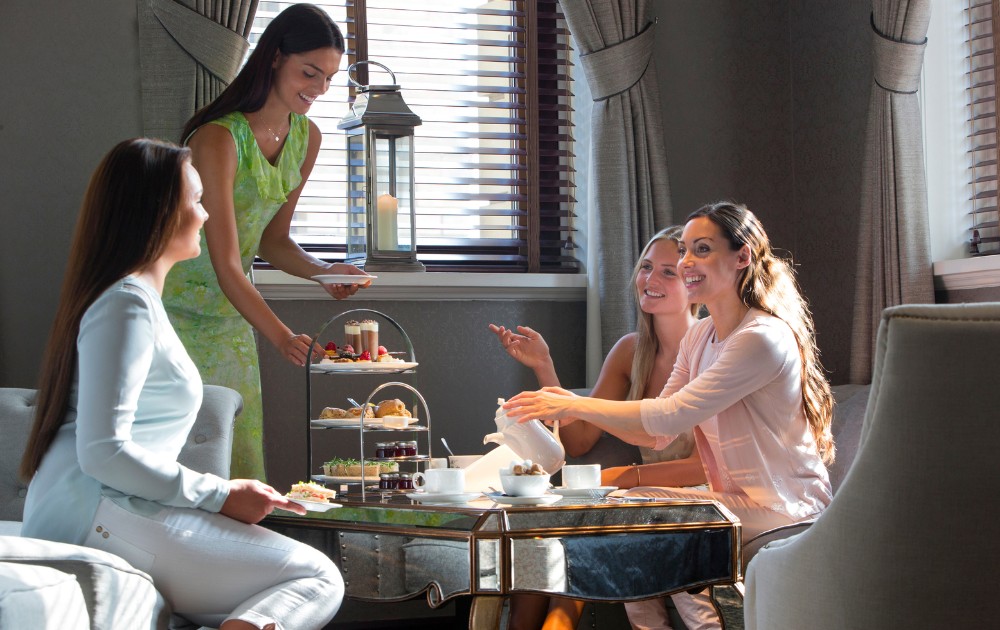Social events play a significant role in building connections, fostering personal growth, and enhancing overall well-being. However, finding the right type of social event can be challenging, especially for autistic adults.
The sensory, social, and environmental factors that make up traditional gatherings may not always align with the preferences or needs of individuals with high-functioning autism. By tailoring social events to be inclusive and accommodating, we can create environments where autistic adults feel more comfortable and engaged.
Below, we explore different types of social events and considerations that make them suitable for autistic individuals.
Small, Quiet Gatherings
Many autistic adults thrive in environments that minimize sensory overload and provide opportunities for meaningful interactions. Small, quiet gatherings can offer a low-pressure setting where participants can connect without feeling overwhelmed by noise, large crowds, or chaotic surroundings. These events might include:
- Book Clubs: Book clubs allow for focused discussions and cater to those who prefer structured, topic-specific interactions. They are typically quiet and predictable, making them an excellent choice.
- Game Nights: Board games, card games, or other low-stimulation games provide a structured activity that helps guide the interaction, making socializing feel more manageable.
- Tea or Coffee Meetups: Meeting for tea or coffee in a calm setting can offer a relaxed environment for conversation. Choosing venues with quiet spaces or outdoor seating can further enhance comfort.
Interest-Based Groups and Workshops
Engaging with others who share a common interest is a wonderful way for autistic adults to build connections without the pressure of unstructured socializing. Interest-based groups create a natural focus and help reduce anxiety by centering discussions on topics participants are passionate about. Examples include:
- Hobby Groups: Whether it’s knitting, photography, gardening, or model building, hobby groups allow participants to focus on an activity while interacting with others. This shared focus reduces the emphasis on small talk and fosters organic communication.
- Skill-based Workshops: Workshops that teach skills such as cooking, painting, coding, or crafting provide opportunities for learning while connecting with others. The structured nature of these events makes them ideal for individuals who prefer a clear sense of purpose.
- Fandom Events: Events like comic book gatherings, movie screenings, or niche interest conventions cater to specific passions and encourage like-minded individuals to connect.

Nature-Based Events
For those who find comfort in the outdoors, nature-based social events offer an excellent opportunity to engage with others in a calm and soothing environment.
Activities such as hiking, nature walks, birdwatching, or picnics can help autistic adults feel more grounded while enjoying a sense of community. These events tend to involve smaller groups, slower paces, and less artificial stimulation, which can be beneficial for sensory sensitivities.
Virtual Social Events
Virtual events have gained immense popularity and offer unique benefits for autistic adults. They eliminate the stress of physical travel, sensory overload, and direct face-to-face interaction while still providing opportunities to connect. Examples of suitable virtual events include:
- Online Gaming Communities: Multiplayer online games allow for interaction without the pressure of physical presence, letting individuals communicate at their own pace.
- Virtual Discussion Forums: Platforms hosting virtual book clubs, hobby groups, or educational sessions provide opportunities to engage from the comfort of home.
- Live-streamed Workshops or Concerts: These allow participants to enjoy events and interact via chat features without leaving their personal space.
Virtual events also give participants the ability to mute or step away if they need a break, offering a level of control that can significantly reduce anxiety.
Autism-Friendly Events
Some social events are designed specifically for autistic individuals, taking into account sensory sensitivities and the need for accommodations. These events may include:

Considerations for Organizers and Participants
When planning or attending social events for autistic adults, it’s essential to consider the following:
Sensory Accommodations
Many autistic adults are sensitive to loud noises, bright lights, or chaotic environments. Choosing venues that minimize sensory triggers – such as quiet cafes, parks, or sensory-friendly facilities – can make a significant difference. Event organizers can also provide noise-canceling headphones, dim lighting, or quiet zones as needed.
Communication Preferences
Autistic adults may communicate in diverse ways. Some prefer verbal conversations, while others may feel more comfortable using written or non-verbal methods. Providing options for both can create a more inclusive environment.
Clear Information and Expectations
Providing detailed information about the event, such as the schedule, location, expected number of attendees, and activities, helps reduce uncertainty. Advanced communication about potential sensory challenges and available accommodations can also help participants prepare.
Opportunities for Breaks
Social events, even enjoyable ones, can be draining. Including designated quiet areas or flexible schedules that allow participants to take breaks is crucial for maintaining comfort and engagement.
Respecting Boundaries
Socializing may be exhausting or overwhelming for some autistic adults. It’s important to respect their boundaries and avoid pressuring them to participate beyond their comfort level.
The Importance of Social Inclusion
Creating spaces where autistic adults feel welcome and understood is vital for fostering social inclusion. Thoughtfully planned events not only benefit autistic individuals but also enrich the broader community by promoting diversity and mutual understanding. By recognizing the unique needs and strengths of autistic adults, we can craft social experiences that celebrate their individuality while building meaningful connections.
Social events don’t have to conform to traditional norms to be successful. By focusing on flexibility, inclusivity, and respect, it’s possible to design environments where everyone, regardless of neurotype, can thrive.
Whether it’s a small book club, a virtual gaming session, or a sensory-friendly festival, the key is to create opportunities that prioritize comfort, engagement, and community for all participants. At Golden Care Therapy, we’re proud to offer top-quality ABA therapy to families seeking autism services in New York, New Jersey, Indiana, Georgia, and Florida.
Our dedicated team focuses on individualized care to help children thrive in every aspect of their lives. Contact us today to learn how we can support your family and create meaningful change together.
Sources:



